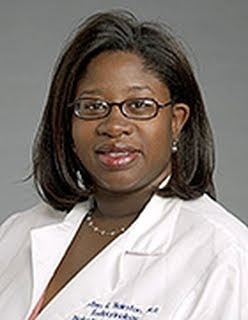UH Case Medical Center study in JCO reinforces focus on personalized treatment for patients based on ethnicity
Clinical research out of University Hospitals Case Medical Center has found that African Americans with a common form of lung cancer have a lower frequency of drug-sensitizing genetic mutations, which may impact response to new cancer-fighting drugs. Published online in the Journal of Clinical Oncology, the study by Rom Leidner, MD, and colleagues report that ethnicity plays a significant role in non-small cell lung cancer (NSCLC) genetics and more personalized treatments may be beneficial to cancer patients.
African American patients with NSCLC are significantly less likely than Caucasian counterparts to harbor activating mutations of the epidermal growth factor receptor (EGFR) gene in their cancers, which suggests that common oral EGFR inhibitor drugs, such as Tarceva® (erlotinib), are unlikely to yield dramatic remissions.
"We are finding that ethnicity may play a significant role in a variety of cancers," says Dr. Leidner, an oncologist with Ireland Cancer Center of University Hospitals Case Medical Center and Visiting Instructor at Case Western Reserve University School of Medicine. "It was already known that a higher proportion of East Asian NSCLC patients harbor mutations of the EGFR gene than Caucasians, and that these mutations are associated with a higher likelihood of major responses to EGFR inhibitors. Before our study, however, surprisingly little data existed for African American patients with this common type of lung cancer."
These findings add to a growing body of evidence demonstrating genetic variation in genetic pathways between ethnic groups, and underscores the need for incorporation of these differences into the design of future clinical trials with agents targeting the EGFR pathway.
Epidemiologic studies have suggested that African Americans have a higher risk of NSCLC and have poorer outcomes with treatment. Ethnic background and genetic make-up are linked, and consequently, may impact the likelihood of major responses to oral EGFR inhibiting drugs. For example, in large international lung cancer trials a higher percentage of East Asian NSCLC patients were found to carry drug-sensitizing mutations of the EGFR gene than Caucasians, and as predicted the highest rates of response to EGFR inhibitor drugs were found in the East Asian patients.
The recently published findings have led the researchers to initiate a follow-up study. This multi-center effort will review the overall rates of response, or lack thereof, among African American patients with NSCLC treated at the Case Comprehensive Cancer Center with EGFR inhibitor drugs during the course of their illness.
"In the future, this may lead clinical cancer researchers to be able to take advantage of these findings for a 'smart-design approach' to clinical trials in lung cancer, with novel treatments and biomarkers employed among different patient populations or even individuals," says Stanton Gerson, MD, Director of the University Hospitals Ireland Cancer Center as well as the Case Comprehensive Cancer Center. "Targeted treatments for patients based on a myriad of genetic and ethnic factors are the wave of the future and may lead the way to improved cure rates for our cancer patients." ###
About University Hospitals
University Hospitals serves the needs of patients through an integrated network of hospitals, outpatient centers and primary care physicians. At the core of our health system is University Hospitals Case Medical Center. The primary affiliate of Case Western Reserve University School of Medicine, University Hospitals Case Medical Center is home to some of the most prestigious clinical and research centers of excellence in the nation and the world, including cancer, pediatrics, women's health, orthopedics and spine, radiology and radiation oncology, neurosurgery and neuroscience, cardiology and cardiovascular surgery, organ transplantation and human genetics.
Its main campus includes the internationally celebrated UH Rainbow Babies & Children's Hospital, ranked second in the nation for the care of critically ill newborns; UH MacDonald Women's Hospital, Ohio's only hospital for women; and UH Ireland Cancer Center, part of the NCI-designated Case Comprehensive Cancer Center. For more information, go to www.uhhospitals.org
Contact: Alicia Reale alicia.reale@UHhospitals.org 216-844-5158 University Hospitals Case Medical Center



































